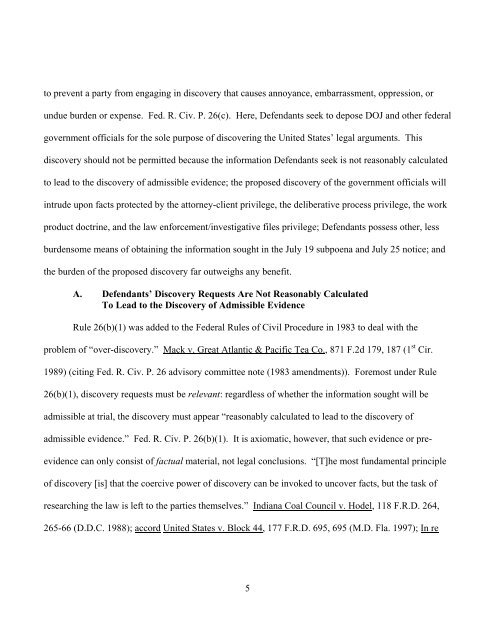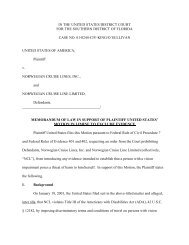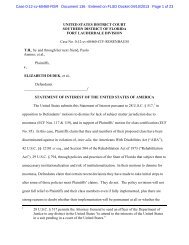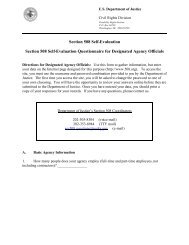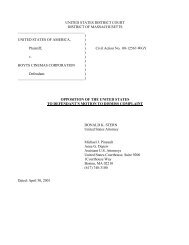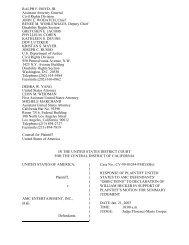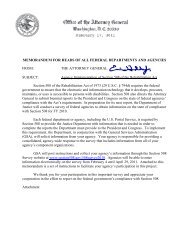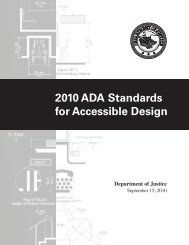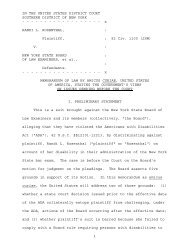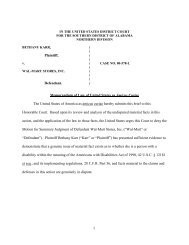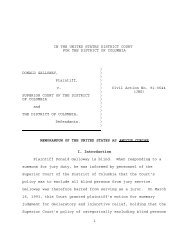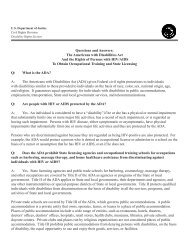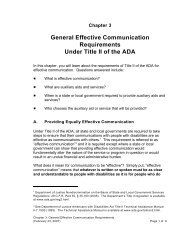US v. Norwegian Cruise Lines, Inc. and Norwegian ... - ADA.gov
US v. Norwegian Cruise Lines, Inc. and Norwegian ... - ADA.gov
US v. Norwegian Cruise Lines, Inc. and Norwegian ... - ADA.gov
You also want an ePaper? Increase the reach of your titles
YUMPU automatically turns print PDFs into web optimized ePapers that Google loves.
to prevent a party from engaging in discovery that causes annoyance, embarrassment, oppression, orundue burden or expense. Fed. R. Civ. P. 26(c). Here, Defendants seek to depose DOJ <strong>and</strong> other federal<strong>gov</strong>ernment officials for the sole purpose of discovering the United States’ legal arguments. Thisdiscovery should not be permitted because the information Defendants seek is not reasonably calculatedto lead to the discovery of admissible evidence; the proposed discovery of the <strong>gov</strong>ernment officials willintrude upon facts protected by the attorney-client privilege, the deliberative process privilege, the workproduct doctrine, <strong>and</strong> the law enforcement/investigative files privilege; Defendants possess other, lessburdensome means of obtaining the information sought in the July 19 subpoena <strong>and</strong> July 25 notice; <strong>and</strong>the burden of the proposed discovery far outweighs any benefit.A. Defendants’ Discovery Requests Are Not Reasonably CalculatedTo Lead to the Discovery of Admissible EvidenceRule 26(b)(1) was added to the Federal Rules of Civil Procedure in 1983 to deal with theproblem of “over-discovery.” Mack v. Great Atlantic & Pacific Tea Co., 871 F.2d 179, 187 (1 st Cir.1989) (citing Fed. R. Civ. P. 26 advisory committee note (1983 amendments)). Foremost under Rule26(b)(1), discovery requests must be relevant: regardless of whether the information sought will beadmissible at trial, the discovery must appear “reasonably calculated to lead to the discovery ofadmissible evidence.” Fed. R. Civ. P. 26(b)(1). It is axiomatic, however, that such evidence or preevidencecan only consist of factual material, not legal conclusions. “[T]he most fundamental principleof discovery [is] that the coercive power of discovery can be invoked to uncover facts, but the task ofresearching the law is left to the parties themselves.” Indiana Coal Council v. Hodel, 118 F.R.D. 264,265-66 (D.D.C. 1988); accord United States v. Block 44, 177 F.R.D. 695, 695 (M.D. Fla. 1997); In re5


